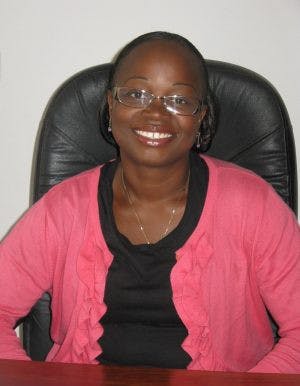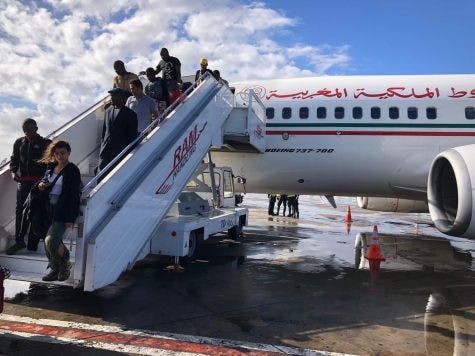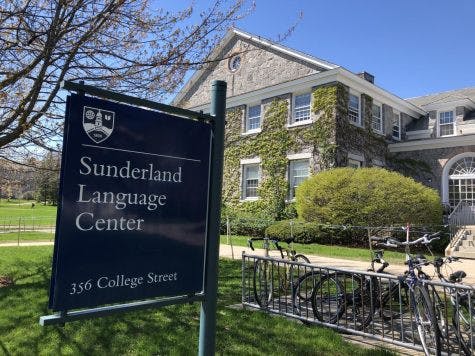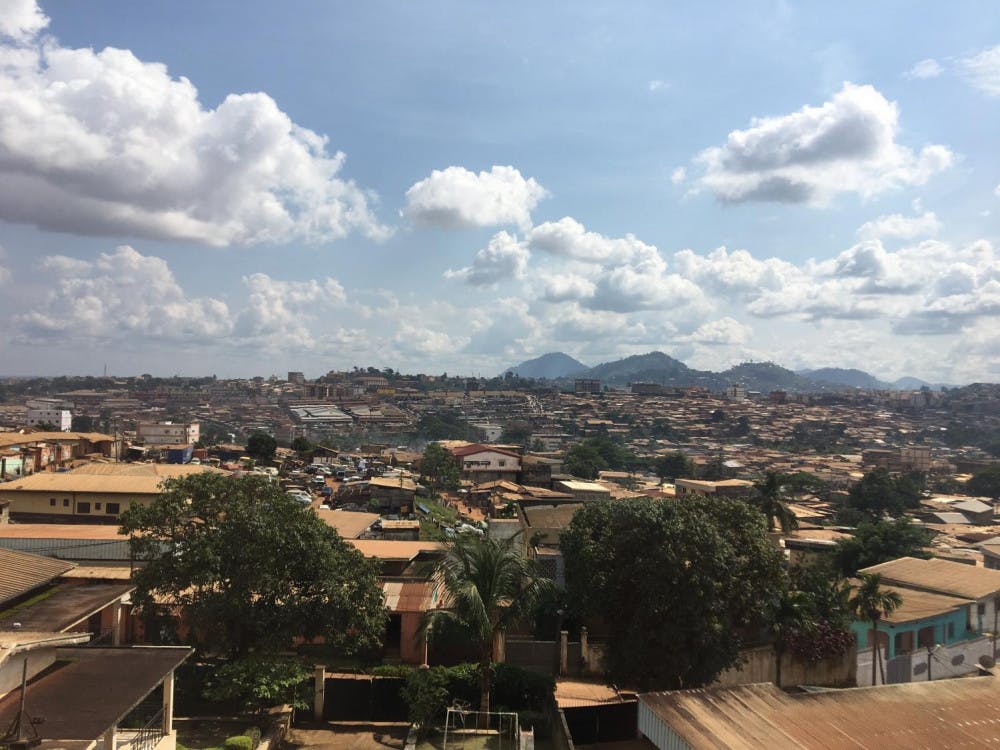One afternoon last October, the four students studying abroad in Middlebury’s school in Yaoundé, Cameroon, received a cryptic message from the program’s director, asking them to meet for dinner at the home of one of their host families.
The puzzled students assumed that the director, Ariane Ngabeu, wanted to discuss some change to the semester’s academic programming. They nearly discounted the possibility that the meeting had anything to do with Cameroon’s contentious presidential elections, which had taken place nine days earlier on Oct. 7, and whose results were slated to be announced within the next week.
“In our wildest dreams it was something about the elections,” said Emily Ray ’20, one of the students in Cameroon last semester. In Yaoundé, the country’s bustling but tranquil capital city, the notion that the election results could unleash a wave of political violence was unthinkable.
But while the students were waiting for Ngabeu to arrive for dinner, they received an email from Nicole Chance, an assistant director for Middlebury’s international programs and a liaison for the Cameroon school. It contained a startling announcement: Middlebury had decided to relocate the four students to Morocco, fearing that electoral violence could sweep Cameroon and shutter its airports. The group would be put on flights to Rabat, Morocco just over a day later, with no guarantee that they would be able to return to Cameroon to finish their semester.
“It was traumatic,” Ray said.
Ultimately, the trip proved to be successful — and also unnecessary. The four students, along with Ngabeu, spent a pleasant week in Morocco before returning to Cameroon, which had remained almost entirely peaceful after the election results were announced.
During the hectic, stressful period immediately before the trip to Morocco, and in the months since, people involved have raised questions about how the decision to relocate was made, whether Middlebury applies standards to its African programs that it would not apply elsewhere, and how Middlebury makes judgments about its faraway programs from a campus in rural Vermont.
MESSAGES FROM MIDDLEBURY
Middlebury’s decision to relocate the students in Cameroon came as the nation, historically one of the stablest in Central Africa, entered a period of relative instability. Within the last two years, peaceful protests by the country’s English-speaking minority against the largely French-speaking national government turned violent after government forces cracked down on protesters. This growing “Anglophone crisis” has caused increased opposition to President Paul Biya, who has led Cameroon since 1982. But Yaoundé is located well within the country’s peaceful Francophone region, and last semester’s students detected little unrest as they navigated the city each day.
“I remember my host mom saying, ‘Oh, Cameroonians don’t go out in the streets, so no one’s going to protest it,’” Ray said. “No one thought that anything bad would happen in Yaoundé.”
Other educational programs operating in Cameroon have had varying responses to the country’s fraught political situation. A program operated by the SIT Graduate Institute hardly altered its plans that semester, Ngabeu said. On the other hand, Dickinson College suspended its long-running program in Yaoundé in December, citing risks posed by the Anglophone crisis.
The first signs of Middlebury’s discomfort came the morning of the elections, when Ngabeu received an email from Liz Ross, Middlebury’s associate dean for international programs, containing a link to a New York Times article published the day before. The article described Cameroon as being “on the brink of civil war,” asserting that the upcoming election was “escalating an already volatile situation” in the country.
“I was surprised,” Ngabeu said. “Because if anything is happening in Cameroon, I’m the first to know about it.”

Ariane Ngabeu, the director of Middlebury's school in Cameroon.
After asking around, Ngabeu said she learned that the images in the New York Times article were out-of-date photographs of the conflict in the Anglophone region, with little bearing on the city of Yaoundé or on the upcoming elections.
Still, several days later, the message from Middlebury had grown more urgent: Chance asked Ngabeu where she would be able to travel with the students, in the event that Yaoundé became unsafe following the announcement of the election results. Ngabeu told Chance she would spend the next day putting together a plan.
Ngabeu reached out to an acquaintance who worked at the Belgian embassy in Yaoundé, asking whether any arrangements had been made to help Belgian nationals stay safe. The employee dismissed her concerns, noting that the embassy was located in Yaoundé’s upscale Bastos neighborhood.
“They told me, ‘No no no, you’re in Bastos! It’s already safe. If you’re afraid, look for a hotel in Bastos,” Ngabeu said.
So Ngabeu wrote back to Middlebury, proposing that she wait out the election results with the students from a hotel in Bastos. But Middlebury staff said this failed to address their main concern: the possibility that Cameroon would close its borders and airports, trapping the students inside the country.
“We were afraid that if [violence] did spread out, that it would be too late for us to make a decision about what to do with the students,” explained Carlos Velez, the dean of international programs, in an interview with The Campus.
Within a day of Chance’s urgent message to Ngabeu, the two of them, along with Velez and Ross, had agreed on Morocco as a destination. Middlebury’s existing program there would provide the infrastructure needed to host the visitors. The only problem was that Ngabeu, a Cameroonian national, needed a Moroccan visa which would take five days to arrive — and the group was set to leave in just two days.
So Ngabeu visited the Moroccan embassy and bribed an employee to expedite the process. Soon after, she sat with the students as they reacted incredulously to the news.
“I said, ‘Don’t ask any questions, because I am not capable of answering them,’” Ngabeu said.

Students from Middlebury's school in Cameroon arrive in Morocco after being flown out of Yaoundé.
Unsure whether they would ever return, students spent the next day hurriedly packing all their belongings, saying goodbye to their host families and traveling around Yaoundé, buying souvenirs to bring back to the United States. Ngabeu left her two young children at home in Yaoundé, presuming that Middlebury would not pay for their travel to Morocco.
“That’s the proof,” Ngabeu said. “I left my children and I went away, because I knew there wasn’t any violence.”
Although Ngabeu was skeptical, she said she suppressed her doubts. “When they say it’s for safety, what can I say? I can’t say with certainty that nothing bad will happen,” she said.
Velez said the Middlebury staff were certain their precautionary steps were the right ones. “Nobody could assure us that nothing was going to happen,” he said. “Even if somebody had, I’m not sure if I would’ve believed it.”
CLAIMS OF UNEQUAL TREATMENT
On Oct. 22, the students watched from Morocco as the incumbent Biya was re-elected Cameroon’s president, earning a suspiciously resounding 71% of the vote. The expected result was received calmly in Yaoundé, and within two days, the students found out they would return to Cameroon. The trip to Morocco had lasted one week.
The trip itself had been enjoyable, Ray said, but the stress caused by the departure did not seem to be fully acknowledged after the group returned. And as the months have gone by, Ray said she has begun to think more critically about Middlebury’s decision to evacuate the group.

Staff from Middlebury's office of International Programs, housed in Sunderland Language Center, first raised concerns about the elections in Cameroon.
“It just makes me mad,” Ray said. “There’s already so many different hurdles and obstacles that the Cameroon program has to go through, because it’s a program in Africa. There’s so much unfounded fear.”
Ray is not the only one troubled by the excursion to Morocco. Nadia Horning, a professor of political science who serves on a faculty committee that oversees the Cameroon program, said she was taken aback when Velez and Chance first notified the faculty committee about the trip — just hours after the decision to evacuate had been made.
“I didn’t take it particularly well,” Horning said. A native of Madagascar who studies African politics, Horning said the incident in Cameroon was the latest in a succession of cases in which the continent has received unequal treatment at Middlebury. She pointed to an effort by faculty several years ago to convince the college to offer Swahili at its summer language schools. After receiving a verbal commitment from an administrator that Swahili would be chosen as the schools’ newest language, Horning said she found out abruptly during a speech by an administrator that Korean had been picked instead.
“That did bother me personally,” Horning said.
When it came to Cameroon, Horning said she understood administrators’ desire to take safety precautions, but still felt the college applied unreasonable standards. “I’m not pro-recklessness and anti-safety,” she said. “But I’m definitely anti-exception. I’m anti-standards for Africa that don’t apply elsewhere.”
Ngabeu suggested that students studying in Asia or Europe would not have been relocated in similar circumstances. “They wouldn’t have done anything,” she said. “People would have stayed where they were.”
Moreover, she worried about the precedent the relocation may have set. “Middlebury really has to reflect on its strategy," Ngabeu said. “Because if every time there's an election, we have to send people to the opposite coast — that's nonsense.”
Velez disputed the idea that any double standard had been applied. “If I fear there will be widespread violence anywhere, I would take more drastic measures,” he said.
Still, many involved with African Studies at Middlebury tell anecdotes about biases and unfounded fears they have encountered on campus. Ngabeu recalled instances in which parents of students interested in the program asked her how their children would drink water or receive medical care in Cameroon, presuming the country did not have hospitals.
One first-year at Middlebury, interested in studying in Cameroon, told The Campus that a French professor recently tried to dissuade her from going and urged her to study in France instead.
“When I asked him why, he discussed African accents, meaning it would be really hard for me to understand an African accent and that when I came back from Cameroon, I would have an African accent,” said the student, who was granted anonymity so she could speak freely about the exchange. “He implied that that wouldn’t be good for my future career prospects,” she recalled, adding that the professor “made a face” as he discussed African French.
Seeking to expand Middlebury’s curricular offerings outside of Francophone Europe, Charlotte Cahillane ’19.5 and Zorica Radanovic ’19 — both alumnae of the Cameroon program — wrote an op-ed in this week’s Campus, advocating that the French Department create more courses that venture “beyond the geographic boundaries of France.”
For those involved in the October evacuation, meanwhile, the heart of the problem seems to lie beyond Middlebury’s campus. Ngabeu, for her part, says she cannot blame Middlebury staff for the decision they made, given that they had to account for Americans’ general prejudices towards Africa.
“It’s a question of how Americans look at us,” she said. “It’s not that Middlebury wanted to do this, it’s that Middlebury wants to show to other institutions, to parents, to Americans — ‘You know that our kids are in this country, and we’re taking care of them.’”
“The problem is distant,” Ngabeu said. “Middlebury only acted to respond to what others were thinking.”
Middlebury Evacuated its School in Cameroon. Was it the Right Decision?

MIDDLEBURY INTERNATIONAL PROGRAMS
COURTESY PHOTO
NICK GARBER/THE MIDDLEBURY CAMPUS
Comments



